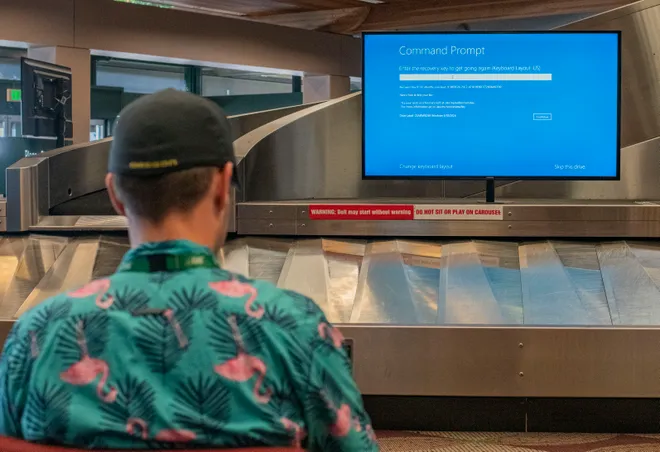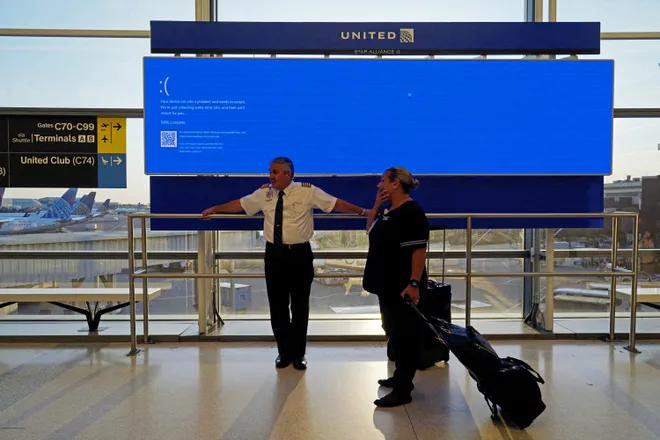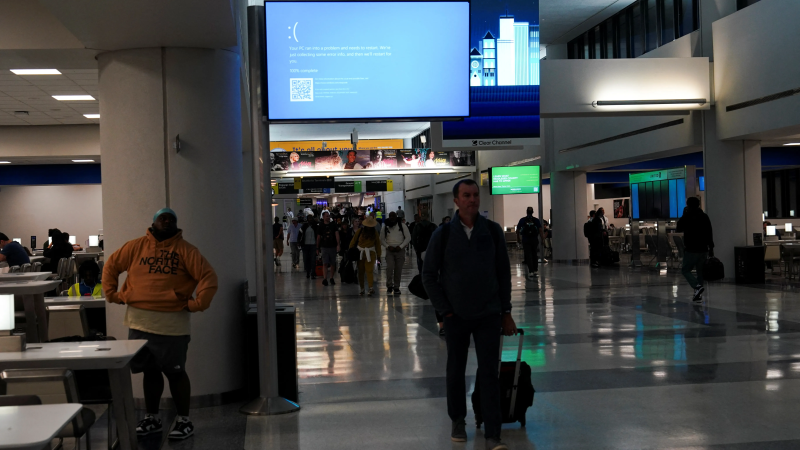Day of chaos: How CrowdStrike outage disrupted 911 dispatches, hospitals, flights
The first hints of imminent global chaos came in the dead of night.
A U.S cybersecurity firm that serves hundreds of Fortune 500 companies alerted clients a software glitch was causing computer users' worst nightmare: the “Blue Screen of Death.” CrowdStrike blamed a botched update to its “falcon Sensor software” in the 1:30am ET alert, saying it was causing Microsoft Windows to crash.
When Ty McKinnie arrived in the early morning hours at New York’s LaGuardia Airport, he was unaware of the brewing storm and unprepared for the blue death screens all around him. McKinnie, a 31-year-old musician and filmmaker, was focused on getting home to North Carolina for his grandfather’s funeral.
“I'm thinking “Oh, it’s a display issue, someone needs to fix the computer,’” he said. “I didn’t think it was an actual worldwide system going down.”
Like many Americans, McKinnie took to social media to share his confusion, where he quickly realized that the issue wasn’t just hitting New York. The outage had impacted more than 10,000 flights, knocked parts of public transit systems offline, disrupted operations at hospitals and 911 call centers, and sent global stocks sliding.
As the day unfolded hour by hour, blue screen by blue screen, tech issues cropped up in vastly different industries, reminding people across the country and the world just how much society has come to rely on interconnected technology - and how vulnerable that has made us to a software glitch or cyberattack.

McKinnie’s flight would be delayed twice before it was finally canceled, forcing him to spend hours in a rebooking line so long it wrapped around itself like a snake. By the time McKinnie made it to the front, no other flight out would get him to the funeral on time. Even if he drove, he’d miss it. He said he left the airport six hours after he'd arrived “defeated, really angry, with tears in my eyes.”
"I just hope this doesn't happen again to this scale. I mean, things happen, but the fact that this is a massive thing, and it's not just airlines, it's banks, it's computer systems," he said. "For things to be this interconnected, it shouldn't be this easily penetrable."
Live updates:Global tech outage hits airlines, banks, health care and public transit
911 dispatchers turn to pen and paper during CrowdStrike crisis
Within hours of CrowdStrike sending out its alert, the outage struck 911 call centers across the country.
In Alaska, both non-emergency and 911 calls went unanswered at multiple dispatch centers for seven hours.
Some personnel were shifted to the centers that were still up and running to help with their increased load of calls, while others switched to analog phone systems, Austin McDaniel, state public safety department spokesperson, told USA TODAY in an email. McDaniel said they had a plan in place, but the situation was "certainly unique.”
Agencies in at least seven states reported temporary outages, including the St. Louis County Sheriff's Office, the Faribault Police Department in Minnesota, and 911 systems in New Hampshire, Fulton County, Indiana, and Middletown, Ohio. Reports of 911 outages across the country peaked at more than 100 on Friday just before 3 a.m., according to Downdetector.
In Noble County, Indiana, about 30 miles northwest of Fort Wayne, 911 dispatchers were forced to jot down notes by hand when the system went down in the early morning hours, according to Gabe Creech, the county's emergency management director. While the outage persisted from 1 a.m. to 3 a.m. ET, some calls were routed to dispatchers in surrounding counties who could transfer information back to Noble County first responders, he said.
"We had to switch over to our backup 911 system," said Creech.

A White House wake-up call on CrowdStrike
Anne Neuberger, deputy national security adviser for cyber and emerging technology, started her day with a 4 a.m. ET wakeup call from the White House Situation Room on the developing CrowdStrike crisis. Neuberger said during a panel at the Aspen Security Forum Friday that she spent the morning assessing the outage's impact on the nation’s critical infrastructure sectors and spoke with George Kurtz, CrowdStrike’s CEO, POLITICO reported.
President Joe Biden was briefed on the outages, and his team was in touch with the cybersecurity firm, as well as with impacted companies and agencies, according to the White House. Biden would receive "sector-by-sector updates throughout the day and is standing by to provide assistance as needed," the White House added.
Kurtz, meanwhile, apologized for the disruptions in an early morning interview with NBC's Today and said in a post on X at 5:45 a.m. ET that the issue had been identified, a fix had been deployed, and the company would "continue to provide complete and continuous updates on our website." He stressed that the incident was "not a security incident or cyberattack."
Dmitri Alperovitch, CrowdStrike's former chief technology officer, is a member of the Biden administration's Homeland Security Advisory Council, which is meant to provide advice and expertise to support decision-making "across the spectrum of homeland security operations." Alperovitch declined to comment Friday to USA TODAY, either in his capacity as a former top CrowdStrike official or in his current role on the Homeland Security Advisory Council.
"I am not there anymore and not commenting," he said in a text, in reference to CrowdStrike.
Doctors appointments, medical procedures canceled across country
Shahana Hanif, a New York City councilmember in Brooklyn, commuted forty-five minutes to her doctor’s appointment this morning before being told all appointments were canceled because of the tech outage.
“I’m grateful that this was a non-urgent matter but, interruptions in patient care and treatments can have serious consequences,” Hanif said in a post on X.
The outage indiscriminately impacted healthcare services across the country. American Hospital Association officials were working with the federal government and facilities nationwide to address the outage and “understand its scope and impact,” said John Riggi, the AHA’s national advisor for cybersecurity and risk.
Mass General Brigham in Boston canceled previously scheduled non-urgent surgeries, procedures and medical visits, according to a statement sent to USA TODAY. Its facilities remained open for urgent health concerns and emergency department visits and continued treating patients who were receiving care in the hospital.
In the Midwest, Cincinnati Children's Hospital said many of its Microsoft-based computer systems were down, which forced the hospital to cancel appointments before 10 a.m. ET. Patients were told to expect delays throughout the day.
Doreen McGettigan, 65, of suburban Philadelphia, said she’s feeling angst-ridden because Penn Medicine canceled an appointment to check whether her colon cancer is still in remission. Despite multiple attempts both online and over the phone, she was unable to reschedule the appointment because the hospital was overwhelmed with calls and queries due to the outage.
Timing is critical for McGettigan. If she’s unable to get her scan done next week, she’ll be forced to delay an appointment with her oncologist who needs the scan to verify she’s still in remission. It also could interfere with a vacation and an unrelated surgery scheduled next month.
“Anxiety for cancer patients is a real thing – and it’s terrifying,” said McGettigan. “I'm just trying to keep telling myself this is the world we live in right now, and I just have to be calm.”
CrowdStrike-caused outages delay commuters and transit
Just as many Americans were beginning their commute Friday, public transit systems across the U.S., including Washington’s Metropolitan Area Transit Authority in D.C., the New York’s Metropolitan Transportation Authority, Metro Transit in Minneapolis, Cincinnati Metro and Oakland, California-based Alameda-Contra Costa Transit District were hit with delays, website and app outages, problems with their social media feeds and issues with payment and ticketing systems.
Delays on some commuter rail lines in the Chicago area were as long as 45 minutes, The Chicago Tribune reported. Chicago Transit bus and rail service was not affected.

The outage also affected operations at U.S-Canada and U.S.-Mexico border crossings.
CBP One, an app developed by U.S. Customs and Border Protection for migrants, travelers, bus operators, pilots, commercial truck drivers and others, was experiencing technical issues. Customs and Border Protection’s desktop border wait times website appeared to be experiencing an outage as well.
The Detroit Free Press reported stalled traffic on the Ambassador Bridge, which connects the city with Windsor, Ontario, Canada. “Vehicles appeared to be going about 10 mph into America and moving a little faster—about 25 mph—into Canada,” the outlet, part of the USA TODAY Network, reported just before 9 a.m. Traffic was also slow at the Detroit-Windsor Tunnel, more so for those entering the U.S. than those going to Canada.
Doug Witten, who was stuck in traffic Friday on the Blue Water Bridge to Canada, warned that the incidents were an example of just how vulnerable and interconnected our digital systems are and why threat protection from criminals, terrorists and foreign nations is so vital.
"What I'm scared about, as a cyber security professional, is what could happen," Witten, an assistant professor of computer science at Wayne State University, told the Free Press. "If this were an attack, we wouldn't be recovering from it."
Contributing: Josh Meyer, Gabe Hauari, Kim Hjelmgaard, Christopher Cann, Felecia Wellington Radel, Adrianna Rodriguez, Bailey Schulz, Zachary Schermele, Cybele Mayes-Osterman, Phaedra Trethan, and Ken Alltucker, USA TODAY
Disclaimer: The copyright of this article belongs to the original author. Reposting this article is solely for the purpose of information dissemination and does not constitute any investment advice. If there is any infringement, please contact us immediately. We will make corrections or deletions as necessary. Thank you.






